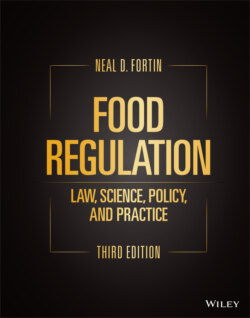Читать книгу Food Regulation - Neal D. Fortin - Страница 287
5.6.6 The Pearson Claims Revisited
ОглавлениеRegarding the particular health claims proposed by the Pearson plaintiffs, the FDA developed “qualified” claims that would be appropriate on food labeling, even in the absence of evidence meeting the “significant scientific agreement” standard.
One of the agency’s qualified claims for folate is:
Healthful diets with adequate folate may reduce a woman’s risk of having a child with a brain or spinal cord birth defect. Women capable of becoming pregnant should take 400 mcg of folate per day from a supplement or fortified foods and consume food folate from a varied diet. It is not known whether the same level of protection can be achieved by using lower amounts.
The agency’s qualified claim for omega‐3 fatty acids and CHD is:
The scientific evidence about whether omega‐3 fatty acids may reduce the risk of coronary heart disease (CHD) is suggestive, but not conclusive. Studies in the general population have looked at diets containing fish, and it is not known whether diets or omega‐3 fatty acids in fish may have a possible effect on a reduced risk of CHD. It is not known what effect omega‐3 fatty acids may or may not have on risk of CHD in the general population.
Regarding dietary fiber, the FDA found no basis to conclude that the available evidence permitted a comparably nonmisleading use of qualified information. Regarding the antioxidants and cancer risk claim, further evidence suggests other factors in whole food or the relative presence of some foods and the absence of other foods are more important than the level of individual nutrients consumed. Research indicates that taking some antioxidants dietary supplement, such as beta carotene, increase the risk of cancer. In addition, there are unknown implications on public health of shifting the emphasis away from whole food toward nutrient supplements.42
